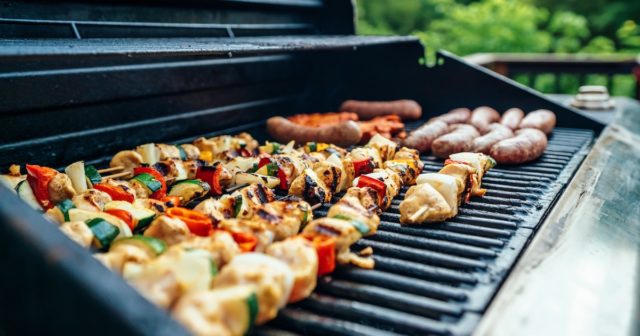Nothing says “summer” quite like an outdoor barbecue. Are you ready to fire up the grill? Before you break out the charcoal or propane, let’s review some safety tips.
First, some interesting grilling facts from the National Fire Prevention Association:
- 70 percent of Americans own a grill, and 64 percent of these are gas grills.
- Grills cause an average of 10,200 home fires a year.
- July is the peak month for grill-caused fires, followed by June, May, and August.
- More than 19,000 people go to the ER each year with grill-related injuries. More than 9,300 of those are thermal burns.
The North Carolina fire code says you can’t use charcoal grills on combustible balconies or within 10 feet of a building of combustible construction. That includes just about every building that isn’t made out of brick. Exceptions are one and two-family dwellings and buildings where balconies and decks have automatic sprinkler systems. Gas grills with propane tanks larger than 2.5 lbs. cannot be used or stored within 10 feet of combustible construction.
Now that we’ve covered the law, let’s talk safety with these six tips:
Only use your grill outdoors
- Keep a fire extinguisher or garden hose nearby.
Leave your gas grill hood open while lighting
- Propane can accumulate under a closed lid and explode.
- Leave the hood open until the grill has ignited.
- Check grill for leaks and hoses for cracks or loose connections before lighting.
- Shut off the valves to the propane tank after use.
Never use charcoal lighter fluid on burning coals
- Even if you don’t see flames, adding lighter fluid can cause a big flare-up. You’ll end up with singed eyebrows at best, or at worst a serious burn or fire.
- Never use lighter fluid or charcoal in a gas grill.
- Put used coals in a metal container with a lid after they’ve cooled completely.
Don’t grill near flammable materials, such as pine needles, leaves, or mulch
- Check for low or overhanging tree branches around and above your grill.
- Look up! The space above your grill should be clear of combustible materials, just like the space around it.
Clean your grill after each use
- This removes grease that can start a fire or turn rancid. Pay no attention to what your neighbor says about never cleaning the grill because it improves flavor. You won’t find “rancid grease crust” on any menu anywhere.
- Deep clean your grill at least once a year.
Don’t leave a lit grill unattended
- Keep kids and pets from playing near the grill, and make sure an adult always has an eye on the grill.
- Remember a grill stays hot long after you’re done cooking.
Always follow the manufacturer’s instructions
- This is especially important for turning on and lighting your gas grill.
As our outdoor spaces become more important, you can create an oasis with beauty and safety in mind. If designing an outdoor kitchen, make sure the cooking areas are near a water source and away from tree branches or anything else likely to catch fire. When it comes to enjoying your outdoor space with family and friends, safe grilling should be a priority. These tips and some common sense will have you happily grilling all summer long.

